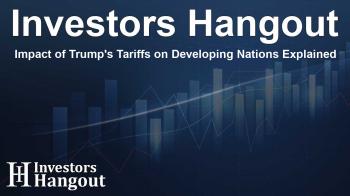Impact of Trump's Tariffs on Developing Nations Explained

Understanding Trump's Tariff Policies and Their Impact
The tariff policies set forth during the Trump administration have raised significant concerns regarding their impact on less affluent nations. Surprisingly, these tariffs seem to disproportionately burden poorer countries compared to their wealthier counterparts who have benefited from preferential trading terms for many years.
Disparities in Tariff Imposition
Analyzing the tariff framework reveals noteworthy disparities. While wealthier nations such as South Korea, Japan, and members of the European Union faced tariffs ranging from 10% to 15%, developing countries such as Vietnam, Bangladesh, South Africa, and Iraq were subjected to tariffs soaring to 20% or beyond.
Severe Tariffs on the Poorest Nations
Among the most striking instances, nations like Myanmar and Laos encountered exorbitant tariffs that reached up to 40%, a move that jeopardizes their ability to export goods to the U.S. These nations, typically reliant on trade with developed countries, find themselves at a significant disadvantage.
Rising Tariffs on Strategic Trade Partners
Recent announcements regarding tariffs reflect a continued trend of escalating rates. Notably, plans were revealed to increase tariffs on India to an unprecedented 50% amidst ongoing tensions related to India’s imports of Russian oil.
Expert Opinions on Tariff Impacts
Deborah Elms, who heads trade policy at a prominent Asian think tank, has noted that the changes in tariff structures critically impact the treatment of the least developed nations. Elms emphasized how this alteration leaves developing countries grappling with hefty tariffs.
Inconsistent Tariff Logic
Experts, including David Henig from the European Center for International Political Economy, have expressed confusion regarding the inconsistency of these tariffs. They highlight the lack of clarity surrounding the rationale behind why certain nations face burdensome tariffs while others are spared, especially those with strong geopolitical ties to the U.S.
The Broader Implications of Tariff Policies
This shift in tariff strategy marks a significant break from prior traditions. Historically, the world’s least developed nations were afforded more lenient trade terms, often to encourage economic growth. The current demands from the Trump administration for reciprocal investments place these developing countries in a precarious situation.
Economic Disparities and Future Relations
As the landscape evolves, the consequences may lead to an exacerbation of existing economic divides between developed and developing nations. This shift raises concerns about effective international trade relationships and the potential for heightened tensions regarding trade policies.
Frequently Asked Questions
How have Trump's tariffs affected developing countries?
Trump’s tariffs have imposed significantly higher rates on developing nations compared to wealthier countries, impacting their export capabilities.
What are the tariff rates imposed on various countries?
Developing countries often faced tariffs of 20% or more, while wealthier nations dealt with rates around 10-15%.
Why were certain countries spared from tariffs?
Countries with strong geopolitical or economic ties to the U.S., such as Saudi Arabia and the UAE, were often exempt from harsher tariffs.
What is the likely outcome of these tariff policies?
The policies may deepen economic inequalities and strain international relations as developing countries struggle to comply with U.S. demands.
How does this affect global trade relations?
These tariff impositions can lead to a reevaluation of trade agreements and relationships, potentially resulting in increased tensions worldwide.
About The Author
Contact Hannah Lewis privately here. Or send an email with ATTN: Hannah Lewis as the subject to contact@investorshangout.com.
About Investors Hangout
Investors Hangout is a leading online stock forum for financial discussion and learning, offering a wide range of free tools and resources. It draws in traders of all levels, who exchange market knowledge, investigate trading tactics, and keep an eye on industry developments in real time. Featuring financial articles, stock message boards, quotes, charts, company profiles, and live news updates. Through cooperative learning and a wealth of informational resources, it helps users from novices creating their first portfolios to experts honing their techniques. Join Investors Hangout today: https://investorshangout.com/
The content of this article is based on factual, publicly available information and does not represent legal, financial, or investment advice. Investors Hangout does not offer financial advice, and the author is not a licensed financial advisor. Consult a qualified advisor before making any financial or investment decisions based on this article. This article should not be considered advice to purchase, sell, or hold any securities or other investments. If any of the material provided here is inaccurate, please contact us for corrections.

